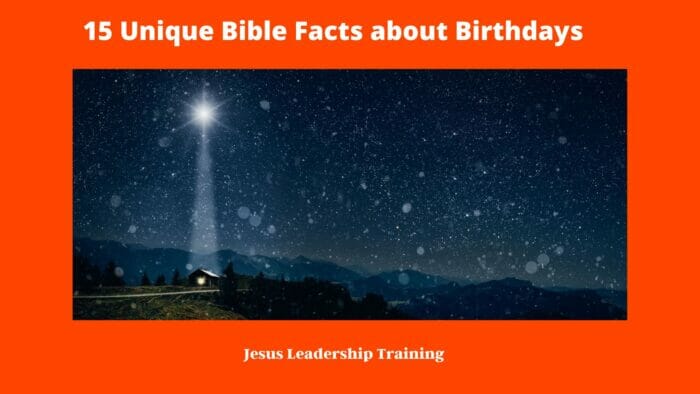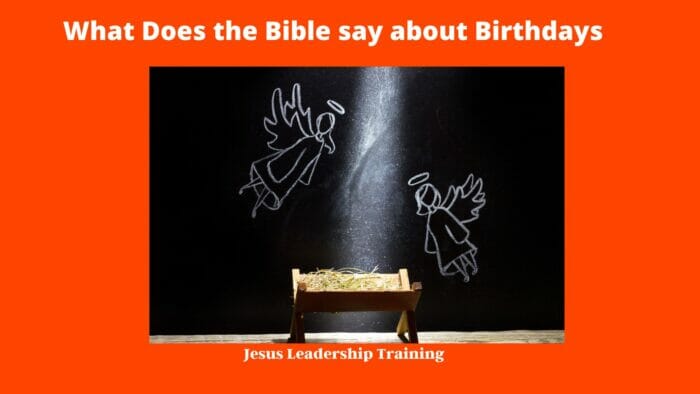– The Bible does not contain any explicit instructions or prohibitions regarding celebrating birthdays, though there are a few references to birthdays in the Bible.
In the Old Testament, Pharaoh, the king of Egypt, celebrated his birthday with a feast and a gift (Genesis 40:20). In the New Testament, Herod Antipas, the ruler of Galilee, celebrated his birthday with a lavish banquet (Mark 6:21-22).
- Pharaoh (Genesis 40:20-22): The Egyptian Pharaoh celebrated his birthday by making a feast for all his servants. During this celebration, he restored his chief butler to his position but executed his chief baker. This event is notable because Joseph interpreted the dreams of both the butler and the baker, which came to pass on Pharaoh’s birthday.
- Herod Antipas (Matthew 14:6-11; Mark 6:21-28): Herod held a birthday banquet, during which the daughter of Herodias danced for the guests. Pleased, Herod promised to give her whatever she asked for. Prompted by her mother, she requested the head of John the Baptist, leading to John’s execution.
These events show that birthdays were celebrated in Biblical times and reflect the importance of marking special occasions. Additionally, the Bible speaks to the importance of honoring parents and grandparents on their birthdays (Exodus 20:12; Deuteronomy 5:16).
While the Bible does not explicitly command believers to celebrate birthdays, it does encourage us to honor and respect those around us, both in the present and in the past.
Table of Contents
What Does the Bible say about Birthdays
The Bible is one of the most influential books in history. It has been read, studied, and discussed for centuries and remains an important part of many people’s lives. It is a source of wisdom, guidance, and comfort, and it contains many stories and lessons that are relevant to our lives today. One such topic is birthday celebrations. Birthdays have been a part of human culture for millennia, but what does the Bible say about celebrating them?

Actual Hebrew Words (Symbols) that Translate Birthday
- Yom Huledet – “Day of Birth” – This is a straightforward translation of the word “birthday” and can be used to describe any birthday celebration.
- Yom Hana’ah – “Day of Joy” – This is a more poetic way of saying “birthday” and is often used to describe a special or special occasion birthday.
- Yom Simcha – “Day of Celebration” – This phrase is often used to describe a more festive birthday celebration.
- Yom Geulah – “Day of Redemption” – This phrase is often used to describe a birthday that marks a special milestone or accomplishment.
- Yom Yerushalayim – “Day of Jerusalem” – This phrase is often used to describe a birthday that is celebrated in the holy city of Jerusalem.
- Yom Hachayim – “Day of Life” – This phrase is often used to describe a birthday that marks the start of a new life or phase of life.
- Yom Hagadol – “Great Day” – This phrase is often used to describe a birthday that is particularly significant or special.

Actual Greek Words (Symbols) that Translate Birthday
- Γενέθλια (Genethlia): This is the most common way to say “birthday” in Greek. It literally translates to “birth festival” and is used both for birthdays and anniversaries.
- Γενέθλια ημέρα (Genethlia Imera): This translates to “birthday day” and is often used when wishing someone a happy birthday.
- Γενεθλιάζω (Genethliazō): This is the verb form of “birthday” and literally translates to “I celebrate a birthday”.
- Γενεθλιάρικο (Genethliariko): This translates to “birthday present” and is often used to refer to a gift given on someone’s birthday.
- Γενέθλιος (Genethlios): This is an adjective and literally translates to “birthday”, usually used to describe something related to a birthday.
The Etymology of ‘Birthday’
First, let’s look at the etymology of the word ‘birthday.’ The word ‘birthday’ is derived from the Old English ‘byrthdæg’ which translates to ‘birth day’. The word ‘birth’ comes from the Old English ‘bærth’ which means ‘to bear’ or ‘bring forth.’ Thus, the term ‘birthday’ is a combination of the words ‘birth’ and ‘day’ which signifies the day of one’s birth.

The Origin of Celebrating Birthdays
Birthdays are an ancient tradition, dating back to before the time of Christ. Ancient Egyptians celebrated the birth of their Pharaohs, while the Ancient Greeks celebrated the birth of their gods. Ancient Romans celebrated the birthdays of their friends and family, while the Ancient Chinese celebrated the birth of their emperors. Though the traditions of celebrating birthdays have evolved over time, the idea of marking the day of one’s birth remains the same.
Bible Storey
A Brief History of Birthdays
Birthdays have been celebrated in different ways in different cultures throughout history. In the Middle Ages, birthdays were celebrated with feasts and parties.
In the 18th century, birthdays began to be celebrated with cakes, candles, and gifts. Today, birthdays are celebrated in many ways depending on the culture and beliefs of the person celebrating.

Weird Birthday Traditions Around the World
Birthdays are celebrated all around the world, and while some customs may seem familiar, others might strike as peculiar or unique. Here’s a list of some of the more unusual birthday traditions from various countries:
- Canada: The birthday person may get “ambushed” and have their nose greased with butter or margarine. This supposedly makes the individual too slippery for bad luck to catch them!
- Mexico: “La Mordida” is the tradition where the birthday person’s hands are tied behind their back and their face is pushed into the birthday cake.
- Russia: Instead of birthday gifts, some celebrants receive a “pull on the earlobe” for each year they’ve been alive.
- Jamaica: The birthday person might expect to be covered in flour, a tradition known as “antiquing.” If it’s a milestone birthday, be prepared for the flour to be pre-moistened with water!
- Germany: Unmarried 30-year-old men sweep the stairs of city hall while their friends throw trash to symbolize their “old age.” The task is complete when a young woman gives them a kiss.
- Netherlands: When someone turns 50, they are said to be “seeing Abraham” for men or “seeing Sarah” for women, referring to the biblical figures. They might receive a special cake shaped like Abraham or Sarah or even dress up like them.
- Vietnam: Everyone celebrates their birthday on the same day during the Vietnamese New Year (Tet). Individual birth dates aren’t celebrated, but rather everyone becomes a year older together.
- Denmark: If an unmarried person turns 25, they might get cinnamon thrown all over them. At 30, the spice changes to pepper!
- Norway: The “birthday clapping song” is a tradition. For each year of their age, the birthday person is celebrated with a clap. At the end of the song, they pick up one leg for each year of their age, symbolizing kicking away the years they’ve lived.
- Ghana: “Otofo” is a special yam dish eaten on birthdays, which is considered a staple and significant part of the birthday celebration.
While some of these traditions might seem “weird” or out-of-the-ordinary depending on cultural backgrounds, they all add color, significance, and fun to the celebration of life around the world.
Religious Birthdays that People Celebrate
- Gautama Buddha’s Birthday (April 8th): Buddhists celebrate the birth of their founder, Gautama Buddha, on the eighth day of the fourth lunar month. This is traditionally a time of reflection, prayer and celebration, as well as a time to remember the principles of spiritual enlightenment that the Buddha taught.
- Guru Nanak’s Birthday (November 23rd): Sikhs celebrate the birthday of their founder, Guru Nanak, on the tenth day of the Kartik month. This day is known as Guru Nanak Jayanti and is celebrated with prayer, devotional singing and feasts.
- Christmas (December 25th): Christmas is the celebration of the birth of Jesus Christ, the central figure of Christianity. This holiday is traditionally celebrated with caroling, lighting of candles, gift-giving and family gatherings.
- Diwali (October 30th): Diwali is the most important Hindu festival, celebrating the victory of good over evil. It is observed on the 15th day of the Hindu month of Kartika and is marked with fireworks, feasts, prayer and community gatherings.
- Rosh Hashanah (September 25th): Rosh Hashanah marks the Jewish New Year, which is celebrated on the first day of the month of Tishrei. This is a time for reflection and renewal, as well as for family gatherings and festive meals.
- Eid al-Fitr (May 12th): Eid al-Fitr is a Muslim holiday that marks the end of the fasting month of Ramadan. This is a time for celebration and feasting, as well as for giving thanks to Allah for granting strength and endurance during the month of fasting.
- Epiphany (January 6th): Epiphany is the Christian feast that celebrates the visit of the Three Wise Men to the baby Jesus. This holiday is traditionally celebrated with processions, gift-giving and celebrations of Jesus’ divinity.
- Yom Kippur (October 8th): Yom Kippur is the holiest day of the Jewish year. It is observed on the tenth day of the month of Tishrei and is a day of fasting, repentance and prayer for the forgiveness of sins.
What Does the Bible Say about Birthdays?
When it comes to birthdays, the Bible is surprisingly silent. There is no direct reference to birthdays in the Bible, and it does not explicitly forbid or encourage their celebration. However, the Bible does provide some insight into how we should approach birthdays and the spirit in which we should celebrate them.
List of Religious Days the Bible wants us to celebrate
- Passover (Exodus 12:1-28): Passover is a Jewish holiday commemorating the liberation of the Israelites from slavery in Egypt. It is traditionally observed with a special meal, known as a seder. The meal includes unleavened bread (matzah), bitter herbs, a roasted lamb, and four cups of wine. This holiday is also celebrated by Christians, though in a slightly different way.
- Pentecost (Acts 2:1-41): Pentecost is a Christian holiday that marks the coming of the Holy Spirit to the disciples of Jesus. It is celebrated on the fiftieth day after Easter and marks the beginning of the Church’s mission to spread the gospel. The day is observed with special services and the reciting of prayers.
- Feast of Tabernacles (Leviticus 23:33-44): The Feast of Tabernacles is a seven-day Jewish holiday that celebrates the end of the harvest season. It is observed with a special meal and the reciting of prayers.
- Day of Atonement (Leviticus 16:29-34): The Day of Atonement is a Jewish holiday that marks the end of the High Holy Days. It is observed with fasting and prayer.
- Purim (Esther 9:26-28): Purim is a Jewish holiday that celebrates the deliverance of the Jews from the wicked Haman. It is celebrated with a special meal, the reciting of prayers, and the reading of the book of Esther.
- Feast of Weeks or Pentecost (Exodus 34:22): The Feast of Weeks or Pentecost is a Jewish holiday that celebrates the giving of the Torah to Moses on Mount Sinai. It is observed with a special meal and the reciting of prayers.
- Feast of Trumpets (Leviticus 23:23-25): The Feast of Trumpets is a Jewish holiday that marks the beginning of the civil year. It is observed with a special meal and the blowing of the shofar.
- Day of Jubilee (Leviticus 25:8-17): The Day of Jubilee is a Jewish holiday that marks the end of the sabbatical cycle. It is observed with a special meal and the reciting of prayers.
- Feast of Dedication (John 10:22): The Feast of Dedication is a Jewish holiday that celebrates the re-dedication of the Temple in Jerusalem. It is observed with a special meal and the reciting of prayers.
- Feast of Booths (Leviticus 23:39-44): The Feast of Booths is a Jewish holiday that celebrates the harvest season. It is observed with a special meal and the reciting of prayers.
Who Celebrated Birthdays in Biblical Times?
There are several examples of birthdays being celebrated in Biblical times. The most famous example is Pharaoh’s birthday celebration in the book of Genesis, in which Joseph was given the task of interpreting Pharaoh’s dream. In addition, the Bible mentions the birthdays of several other characters, such as Job, Esther, and Herod.
Are Birthdays Celebrated in Heaven?
The Bible does not specifically address the question of whether birthdays are celebrated in Heaven. However, since Heaven is a place of perfect joy, it is likely that birthdays are celebrated in some form or another.
What Does God Say about Birthdays?
God does not have an explicit opinion on birthdays. However, He does have a great deal to say about how we should approach our lives and our celebrations. He encourages us to be joyful and thankful for our blessings, to use our gifts and talents for good, and to honor and celebrate those around us.
The Christian View of Birthdays
Christians have different views on the celebration of birthdays. Some believe that birthdays are a time to celebrate the life of the person whose birthday it is, while others believe that birthdays should be a time of reflection and prayer. Many Christians believe that birthdays should be celebrated with joy and gratitude, but that they should not be a time of excess or vanity.
Examples of Birthdays in the Bible
As mentioned above, there are several examples of birthdays being celebrated in the Bible. Pharaoh’s birthday is the most famous, but there are also the birthdays of Job, Esther, and Herod. In each of these examples, birthdays are celebrated in some way, usually with feasting and drinking.
The King James Version and Birthdays
The King James Version of the Bible does not contain any direct references to birthdays, but it does contain several passages that are relevant to our understanding of birthdays. For example, Proverbs 27:1 states that “boast not thyself of tomorrow; for thou knowest not what a day may bring forth.” This is a reminder to not be overly confident about the future, and that there are no guarantees that tomorrow will bring good things.
Is it Good to Celebrate Birthdays?
The Bible does not directly answer this question, but it does provide several passages that can help us to form an opinion. For example, James 4:13-14 states that “go to now, ye that say, To day or to morrow we will go into such a city, and continue there a year, and buy and sell, and get gain: Whereas ye know not what shall be on the morrow. For what is your life? It is even a vapour, that appeareth for a little time, and then vanisheth away.” This passage reminds us to live each day to the fullest and to not take our lives for granted.
Bible Verses About Birthdays
The Bible contains several verses that can be used to reflect on birthdays. For example, Psalm 118:24 states that “this is the day which the Lord hath made; we will rejoice and be glad in it.” This verse emphasizes the importance of living each day to the fullest and of being thankful for the gifts and blessings that God has given us.
Where in the Bible does it talk about celebrating birthdays?
The Bible does not explicitly mention celebrating birthdays. However, there are some passages that suggest that birthdays were recognized during biblical times. For example, Genesis 40:20-22 describes Pharaoh’s birthday celebration and Matthew 14:6-11 recounts Herod’s birthday celebration. These passages indicate that birthdays were celebrated in biblical times, although the celebrations were likely not as elaborate as they are today.
15 Unique Facts about Jesus Birthday
Should birthdays be celebrated?
The Bible does not give a direct answer to this question. However, it does provide some guidance on how birthdays should be celebrated. The book of Proverbs states that “a wise man celebrates his joys” (Proverbs 14:17). This suggests that birthdays should be celebrated with joy and wisdom. Additionally, Ecclesiastes 3:4 states that “there is a time for everything, and a season for every activity under the heavens.” This implies that birthdays should be celebrated in an appropriate manner.
Did Jesus celebrate his birthday in the Bible?
The Bible does not record Jesus celebrating his own birthday. However, there are some passages that suggest that Jesus celebrated the birthdays of others. For example, in Luke 2:41-42, Jesus and his family went to Jerusalem to celebrate the Feast of the Passover, which falls on the same day as his own birthday. This suggests that Jesus celebrated birthdays, even if he did not celebrate his own.
List of Pros and Cons of Celebrating Christmas
Pros:
- Christmas is a great time to bring families together. Christmas is a special time of year where families can come together to celebrate, enjoy each other’s company, and create lasting memories.
- Christmas is a time for giving and for spreading joy. People are encouraged to give to those less fortunate and to bring some joy and cheer into the lives of those around them.
- Christmas is a great opportunity to learn about different cultures and traditions. During the holiday season, people from different backgrounds and cultures come together to celebrate Christmas, creating a great opportunity to learn about different customs and beliefs.
- Christmas is a time for reflection and renewal. It’s an opportunity to reflect on the past year, to think about how far we’ve come and to make plans for the future.
- Christmas is a time to celebrate the birth of Jesus Christ. For many, Christmas is a religious holiday that celebrates the life of Jesus Christ and the importance of his teachings.
Cons:
- Christmas can be expensive. The costs of gifts, decorations, food, and travel can add up quickly, leaving families feeling the financial strain.
- Christmas can be stressful. With the added pressures of buying gifts, hosting parties, and attending events, Christmas can be a stressful time of year.
- Christmas can be overwhelming. With so many activities and events to attend, people often feel overwhelmed and exhausted by the end of the holiday season.
- Christmas can be a reminder of loss. For those who have lost a loved one, Christmas can be a difficult time of year.
- Christmas can be a time of excess. With the pressure to buy gifts, eat delicious food, and attend events, people can easily overindulge and forget about the true meaning of the holiday season.
Where did Celebrating Birthdays Come From?
Celebrating birthdays has a long history that dates back to ancient Egypt and Babylon. The ancient Egyptians believed that birthdays were the start of a person’s spiritual life, and they celebrated the day with feasting and offerings. Similarly, the ancient Babylonians held elaborate celebrations for their gods’ birthdays. It is likely that this tradition of celebrating birthdays was passed down to the Hebrews, who, in turn, passed it down to the early Christians.
Birthdays are an important part of many cultures and religions. While the Bible does not explicitly mention celebrating birthdays, there are some passages that suggest that birthdays were celebrated in biblical times. Additionally, the Bible provides guidance on how birthdays should be celebrated in a wise and appropriate manner. Finally, celebrating birthdays can be traced back to ancient Egypt and Babylon, demonstrating that it is an age-old tradition.
What Does the Bible Say about Celebrating Birthdays KJV
While the King James Version (KJV) of the Bible doesn’t explicitly endorse or condemn the celebration of birthdays, there are some verses related to birthdays and the idea of celebrating life. Here’s a table for quick reference:
| Bible Verses | Content Summary | Interpretation/Context |
|---|---|---|
| Genesis 40:20-22 | Pharaoh’s birthday is mentioned, and he makes a feast. | This is one of the earliest mentions of a birthday in the Bible, although the focus is more on Pharaoh’s actions than the celebration itself. |
| Job 1:4 | Job’s sons “feasted in their houses, every one his day.” | While not explicitly called birthdays, these could be interpreted as similar celebratory occasions. |
| Matthew 14:6-10 (KJV) | Herod’s birthday is mentioned; he orders John the Baptist to be beheaded. | This story is often seen as a cautionary tale, though the celebration of the birthday itself isn’t directly criticized. |
| Psalm 139:13-16 (KJV) | David praises God for creating him. | This Psalm could be seen as valuing the life that God has created, possibly giving indirect support to celebrating the gift of life on a birthday. |
| Ecclesiastes 3:1-2 (KJV) | “To every thing there is a season, and a time to every purpose under the heaven: A time to be born, and a time to die…” | This verse suggests that there is a time for everything, including perhaps, celebration of life. |
| James 1:17 (KJV) | “Every good gift and every perfect gift is from above…” | This could be interpreted as a reason to celebrate and give thanks for life, including on birthdays. |
While the Bible (KJV) doesn’t give a definitive stance on celebrating birthdays, the idea of giving thanks for life and recognizing its seasons can be seen as in line with Christian values. Always remember to celebrate responsibly and in a way that honors your faith. 🎉✨
Final Thoughts – What Does the Bible say about Birthdays
Birthdays are an important part of human culture and have been celebrated for millennia. While the Bible does not explicitly address the question of whether birthdays should be celebrated, it does provide insight into how we should approach birthdays and the spirit in which we should celebrate them. Birthdays should be a time of joy and gratitude, and should be used as an opportunity to reflect on the gifts and blessings that God has given us.





